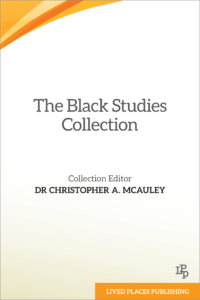Autobiography and Autoethnography: The Most Democratic Narrative Forms
By Dr Chris McAuley, Collection Editor
As any artist will tell us, stories are what drive the creative process and move audiences. And the more honest the story, the greater the impact on hearts and minds.
It is perhaps for this reason that the personal story – the autobiography – occupies such a special place in Black life and letters. For its greatest value lies precisely in its honesty. From the slave narratives of Olaudah Equiano, Frederick Douglass, Harriet Jacobs, and Solomon Northrop, to the many socio-political autobiographies of the twentieth century by such figures as W. E. B. Du Bois, Ida B. Wells, Claude McKay, Zora Neale Hurston, Richard Wright, Kwame Nkrumah, Pauli Murray, Maya Angelou, James Foreman Jr., Malcolm X, Assata Shakur, Harry Haywood, Angela Davis, Bobby Seale, Audre Lorde, and Amiri Baraka to twenty-first century social justice classics by Patrisse Khan-Cullors, Brian Stevenson, and already many others, the autobiography remains one of the essential arenas of Black truth-telling. But these life accounts do so much more: they humanize their own and other Black lives in ways that textbooks and popular pieces hardly ever do; they challenge and correct deliberate misrepresentations of Black lives and how global institutions and policies have actually treated them; they leave memorable imprints on the minds of their readers such that those scenes and images stay with them; they inspire readers to persevere in their personal and social struggles in the knowledge that they are not alone; and they make it known that there is absolutely no basis for their stories to be considered any less valuable than those of any other people.
However, we also know that all stories are not valued equally, because not all people are valued equally. In unequal societies, like our own, certain stories have long been privileged over others to maintain and reinforce social hierarchies. This is why the story gatekeepers have been long at work to ensure that the stories of those they have deemed of lesser value are systematically blocked or distorted. (As I see it, the calculated brouhaha over Critical Race Theory is nothing more than the latest attempt to invalidate those stories that challenge both historical and current North American mythology.) Their worst fear is that those stories prove compelling to larger audiences and that their content reveal the ethical bankruptcy of the privileged ones.
One of the main aims of Lived Places Publishing is to storm the story gates with the lives of people from communities that have been historically silenced and whose image intentionally distorted. The Black Studies Collection of LPP invites the stories of those who see the value of informing, moving, and ultimately transforming their readers through the example and power of their own lives. In these modest ways, we can dismantle oppressive myths and disinformation.
Let me add one final word to potential contributors. As an imprint that is committed to promoting equality through the publication, promotion, and distribution of more stories, and as one with a deep respect for what we might call the Black Autobiographical Tradition, Lived Places Publishing welcomes everyone’s stories regardless of social circumstance or physical location. If we reflect on the lives of the people that I named above, we recognize the cross-section of Black life that they represent, with regard to class, formal training, sexuality, physical freedom, etc. And this is arguably how it should be. Of all the literary genres, the autobiography should be the most democratic. We embrace, then, the plurality of Black experiences, without privileging any one story.
For more information about LPP’s mission, its commitment to open access, author royalties, and other collections in the series, please see our posts about our Founding Mission, our approach to Equity in Royalties and Open Access Publishing, and our website homepage. Otherwise, we look forward to seeing you in print.
|
To submit a proposal, click here: Call for Authors To see the vision for the Black Studies Collection, or get in touch with Dr Chris McAuley, click here: Black Studies To stay connected with Lived Places Publishing, you can subscribe to our email list, to our channel on Medium, or to our Substack list. |
 |
IMAGE CREDIT: Gezer Amorim, used under the Pexels License



